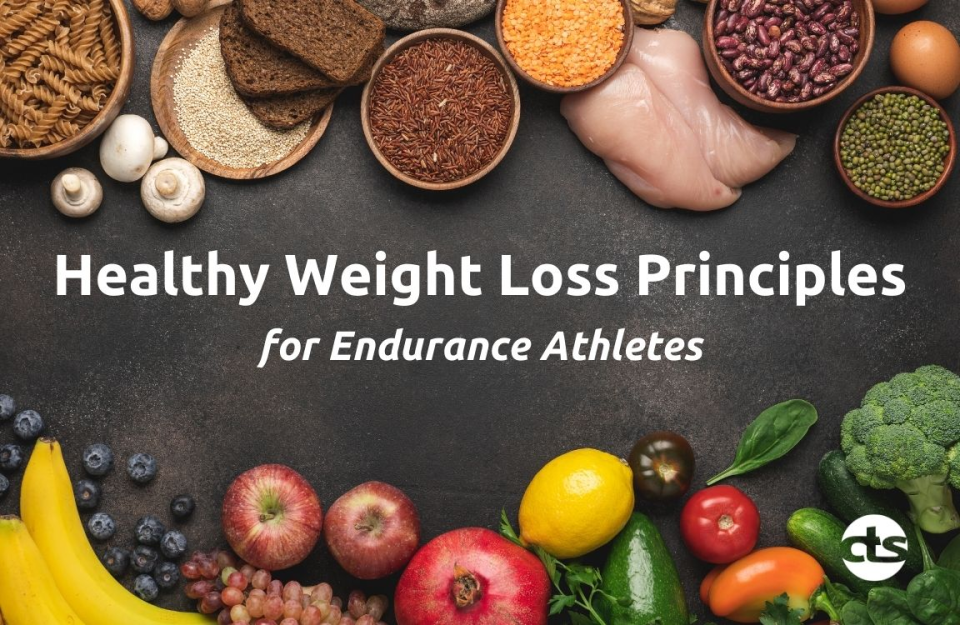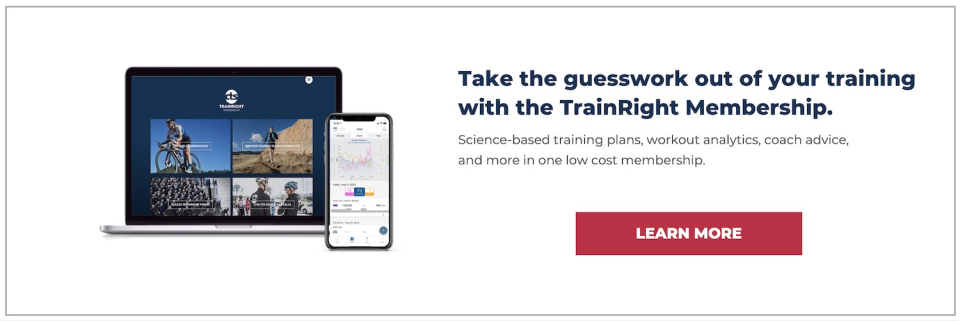Healthy Weight Loss Principles for Cyclists
Races and events are back on the calendar and the weather is getting warmer, so weight loss is a trending topic in coaching conversations across the entire CTS staff of 50+ endurance coaches. No two conversations with athletes about healthy weight loss are exactly the same

There are many factors that influence whether weight loss is advisable for an athlete, whether it’s the right time in their training program to reduce energy intake, and whether specific behavior changes and food choices are going to be sustainable and successful for them. The right plan for an individual athlete is highly variable but should adhere to the basic principles for successful and healthy weight loss that are described below.
Reducing body weight while training for perform at a high level is not as simple as just eating less and training more. In fact, that strategy almost always backfires for athletes who are actively training because the decline in performance from tanking workout quality and hampering recovery is greater than the potential improvement in performance from losing weight. You have to support your activity level and create a moderate energy deficit at the same time, and that takes a more thoughtful approach.
Should you lose weight?
“Why do you want to lose weight?” is the first question I ask an athlete who says they want to reduce body weight. Most of the athletes I work with say they want to get faster on the bike, which leads to a conversation about whether healthy weight loss is the best way to accomplish that goal right now. Yes, being lighter will help you go uphill faster, but only if you don’t lose power in the process of losing weight, which is a distinct possibility. And depending on an athlete’s current fitness level and training phase, the time left before a goal event, and the amount of weight they want to lose, there may be more to potential for performance improvement from focused training compared to weight loss.
Athletes and coaches also have to consider and discuss the risks associated with losing too much weight, trying to reach or maintain an unrealistic bodyweight or body composition, and potentially developing disordered eating behaviors. Lighter is not necessarily better, and your jersey size is not a reflection of your worth.
When should you focus on weight loss?
Losing weight requires work and focus and comes at a cost to training quality and recovery, which is why it is important to align weight loss efforts with your annual training plan. The worst time to purposely create an energy deficit is during a period of high intensity or high volume, event-specific training (like 1-3 months before a goal event). Some moderate weight loss is likely to take care of itself during those periods anyway, but your focused efforts to reduce bodyweight are better planned for periods of generalized, moderate-intensity training.
So, it’s March. If your goal event is in April – June, focus on your training and fueling for high quality workouts and optimal recovery. If your goal events are in mid- to late-summer, you might still be in a more generalized aerobic endurance phase of training, in which case this could be a good time to think about healthy weight loss strategies (as long as you answered ‘yes’ to the initial question of whether you should lose weight). Coach Jason Koop discussed the timing of weight loss for ultramarathon athletes in this article, and the same concepts apply for other endurance sports.
FREE 14 DAY TRIAL! USE CODE: TRM14GFG
Use the above promotion code when signing up for TrainRight Membership for a 14 day no obligation trial. TrainRight Membership comes with a 30-day money-back guarantee!
Principles for Healthy Weight Loss
Avoid severe energy restriction
Some athletes are tempted to dramatically reduce energy intake in an effort to lose weight quickly. This is one of the most destructive methods of weight loss for athletes because it results in a greater loss of lean muscle mass compared to a less extreme energy deficit. (Manore 2015) Severe energy restriction also reduces muscle glycogen stores (which diminishes workout quality), disrupts sleep, increases irritability, and reduces motivation. If your weight has been stable for a while and you want to start losing weight, aim for a 500-700 calorie reduction in average daily energy intake from your current baseline.
Maintain or Increase Protein Intake
For athletes who are actively training (compared to our sedentary counterparts), aim to increase the proportion of total daily calories coming from protein. In other words, reduce your caloric intake by eating less carbohydrate and fat while eating the same amount, or in some cases more, protein. (Aragon 2017) The rationale for this is that you need a constant supply of amino acids for muscle protein synthesis (whether for repair or hypertrophy), and you can use some of that protein to create glycogen through gluconeogenesis. Aim for 1.5-2.0 grams of protein per kilogram of bodyweight per day. Athletes older than 50 should aim for the high end of the range.
Spread protein intake across entire day, including pre-sleep
Muscle protein synthesis happens 24 hours a day, and exercise stimulates an increase in the drive for and rate of muscle protein synthesis, but you don’t have a way of storing amino acids for later use. This is why current literature recommends consuming protein throughout the day, with individual portions being at least 20-40 grams. (Arent 2020) Despite the mass-media declaration that nighttime feeding leads to increased fat mass, recent research discussed in this article indicates that a pre-sleep feeding that includes protein and carbohydrate can increase muscle protein synthesis overnight, replenish glycogen stores, and increase sleep efficiency and sleep quality. (Trommelen 2016)
Align training schedule to normal mealtimes
One strategy for maintaining a caloric deficit while supporting training and recovery goals is to schedule workouts so your post-workout meal aligns with a normal mealtime. In other words, finish your workout and then have lunch or dinner instead of having a post-workout snack and then waiting to have a larger meal later. Across a full day and full week, this consolidation can be helpful for reducing total energy intake without compromising recovery.
Reduce energy density of meals, but retain or increase nutrient density
Reducing the energy density of your diet means reducing your consumption of highly concentrated energy sources and replacing them with foods that contain less energy by volume. Pasta, bread, and potatoes are concentrated carbohydrate sources and great choices when you’re looking to replenish severely glycogen stores and train with high carbohydrate availability tomorrow. Green leafy vegetables and high fiber fruits are examples of low energy density carbohydrate sources. Lots of volume, high water content, high nutrient density, yet not a lot of calories. As Coach Renee Eastman helped me point out in this article, you also have to be aware of the energy density of common protein sources.
The exception to this recommendation is that concentrated carbohydrate sources like ProBar Bolts, ProBar Bites, Muir Energy gels, and Fluid Performance sports drink should still be utilized to consume 60-90 grams of carbohydrate per hour during prolonged exercise bouts longer than 60-90 minutes. Remember, fueling your workouts to support high quality training and recovery is a higher priority than creating an energy deficit.
Eliminate high energy density beverages, including alcohol
One of the easiest ways to reduce daily and weekly energy intake is to eliminate high energy density drinks like soda (yes, that includes ‘carbonated fruit drinks with all natural sugar’), sweet tea (sorry, friends in the Southeast US), some fruit smoothies, and most coffee drinks that take more than two words to describe. Eliminating beer, wine, spirits and mixed drinks should also be part of your weight loss efforts, particularly because they’re not helping your performance or recovery anyway.
To find out more, please visit: https://trainright.com/cycling-for-weight-loss-pros-cons-and-how-to-lose-weight-cycling/

